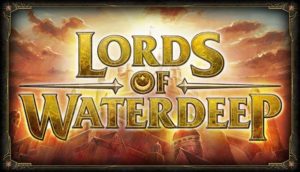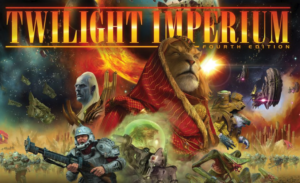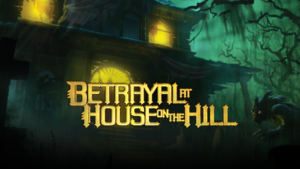I played Dungeons & Dragons for the first time when I was 10 years old, and I was immediately hooked. Up to that point, I had played several different adventure and/or role-playing video games, but there was truly something magical about the real-deal tabletop RPG experience that the digital stuff just couldn’t stand up to.
As I grew up playing video games and tabletop games alike, I realized early on that the obvious drawback to really getting invested in tabletop games is the time commitment, along with needing to lock in a consistent group of folks to play with – which of course includes a dedicated DM that’s willing and able to build satisfying worlds to explore and campaigns to complete. It’s because of this that we started to gravitate away from the tabletop scene, with real life getting in the way it became harder and harder to dedicate the time to D&D. However, it wasn’t long before we discovered there were numerous tabletop games that allowed for us to feel that same D&D experience without the massive commitment – and now our various closets and desks are filled with games we look to when we need to scratch that D&D itch – why don’t we take a look at some of my favorites!

Zombicide – A smash hit Kickstarter sensation, Zombiecide, created by Guillotine Games, is one of my absolute favorite board games of all time, and the support that the game has received in the form of numerous expansion packs and additions leads me to believe this is a game I’ll be playing in new and exciting ways for years to come. The heart and soul of the game is you and your friends are in a cooperative fight to the death against hordes of angry zombies. You and your team choose a character (or characters, in some cases) at the start, with their own stats and skills, and explore the map that you build using the game’s tile system. There’s a level of procedural generation in the way of how you explore, what items you receive (which are cards pulled randomly from a deck) and when/where zombies spawn from that makes each playthrough fresh, even if you’re completing a mission for the 10th time. If you’re at all a fan of the tabletop strategy/RPG genre, and want to get down on whoopin’ some Zombie butt, I’d definitely get your hands on this one – my personal favorite expansion is more or less a revamp of the whole game itself in the form of Zombiecide: Black Plague, which takes you to a more medieval fantasy setting as opposed to the OG game’s modern one.

Lords of Waterdeep – Looking for something Dungeons & Dragons adjacent in terms of tone and setting? Then look no further than Lords of Waterdeep, which is set in the finctional city of Waterdeep, which is pulled straight from the Forgotten Realms and Dungeons & Dragons! The game places you and up to four other players in the shoes of one of the Lords of Waterdeep, secret rulers of the city relying on subterfuge and guile to acquire resources and wealth to take control of the infamous city. Each of you is secretive about which Lord you are (which is a card dealt to you, face down, at the start of the game), as it dictates the kind of quests and overall win conditions that particular Lord needs. The game is more about acquiring resources and “agents” and using them in strategic ways to complete quests – you have the typical D&D classes at your disposal with fighters, rogues, mages, and clerics, which you will use to take on the various quest types – Warfare, Skullduggery, Arcana, Piety, and Commerce. When you complete quests, and complete the conditions on your Lord card, you gain victory points at the end of the game, not unlike the same kind of endgame experience you’d see in a Settlers of Catan. The game takes a little bit to get used to, but once I got the rhythm of the game it’s a solid combo of Settlers and D&D that I love.

Twilight Imperium – Easily the most complex and complicated game of this list, and maybe one of the more complicated games in general that I have ever played – but when I get the hang of the nuance and depth that is Twilight Imperium, it quickly became one of my absolute favorite board games to play. This game is essentially a Star Wars space opera on steroids in board game form – as a player, you take on the role of an entire alien (or not so alien) race in a fictional galaxy, and the other players/races in the game are vying for galactic domination whether through wealth and commerce, diplomacy and political control, by brute force, or maybe by a combination of the three, until one player is strong enough to become the new “galactic emperor” (queue the Unlimited Power meme!). Now, when I say this game is complex, I mean this game is complex. The setup and explanation of the rules of the game took well over an hour the first time I played it, and even then it took a playthrough to get my bearings. But after that, it truly was one of the coolest gaming experiences I’ve ever had – each race has its own unique perks, abilities, ships, combat units, etc, and every single game can be approached from a completely different way depending on the race you choose, how you play, how the dice roll, etc. The game is truly massive in scope, combining aspects of standard tabletop RPGs with games like Risk to create something truly special – keep in mind, though, that if you plan to get your hands on this game, get ready for a somewhat steep learning curve, and very long play sessions – some games have lasted upwards of six hours! But trust me when I say it’s well worth it!

Betrayal at House on the Hill – The only real spooky scary game on the list, Betrayal at House on the Hill quickly became my go-to board game to play with friends and family, not only because it’s a super rad board game, but because it’s relatively easy to jump into and play due to how the gameplay works, and how so much of it is cooperative. The game starts with everyone selecting their character, with each character boasting their own unique allotment of physical (speed and might) stats and mental (sanity and knowledge) stats. You then explore through a procedurally generated haunted house that uses a tile system – exploring a new room has you pulling from a stack of board tiles that you place at the door you’re entering, and the vast majority of the rooms trigger some sort of event that influences the flow of the game. At a certain point, and only once certain conditions are met, a “haunt” happens, which changes the entire direction of the game, which starts as a friendly co-op game with friends exploring a haunted house, and can end with one (or more!) of your so-called friends actually being a traitor with their own motives. There are 50-100 different variations of the “haunt” (50 with the base game, 100 with the volume 2 expansion) that are different based on what room you just explored, and what “omen” card was read last. The game is incredibly fun, with massive replayability, and has become my absolute must-play game when I’m in the mood for a fun RPG board game experience.



